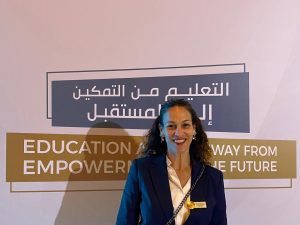Khalifa Award for Education
Prof. Tzipi Horowitz-Kraus from the Faculty of Education in Science and Technology and the Faculty of Biomedical Engineering received the Khalifa Award for Education from the United Arab Emirates last week
Dozens of candidates from UAE and the Arab world were awarded prizes in various categories, but there were only four international winners, including Prof. Horowitz-Kraus, head of the Technion’s group for brain imaging in children. She received the award in the category of outstanding research in the field of early childhood learning.
“It is hard to describe the warm embrace I received, not only from the international judges and hosts, but also from the Emirati royal family, who sponsored the event,” said Prof. Horowitz-Kraus. “I believe this is the beginning of a wonderful friendship and the start of fruitful and exciting collaboration. The award supports the importance and uniqueness of our research, which includes integrating tools from brain research to understand the basic processes supporting language and reading acquisition and examining the impact of intervention programs on these processes. The Emirati award shares our aspiration for a better future for children, based on quality education from an early age. This aspiration transcends cultures and fills me with hope for a better future and for building a bridge between countries, based in part on joint research.”
The Khalifa Award for Education aims to promote the development of education fields, create local and international interactions in the world of education, and foster new dynamics in the educational process, adapting it to current developments in scientific knowledge and information technologies. It was established by the late president of the UAE, Sheikh Khalifa bin Zayed, and continues under the current president, Sheikh Mohammed bin Zayed, under the sponsorship of Sheikh Mansour bin Zayed, vice president and deputy prime minister of the UAE.
The awards were presented at a special conference in education held in Abu Dhabi from May 14-15, and were personally awarded by Sheikh Mansour bin Zayed Al Nahyan. The ceremony was also attended by the wife of the Israeli ambassador to the UAE, Dr. Yifat Turbiner, who is responsible for cooperation in innovation and academic relations.
Prof. Horowitz-Kraus’s research focuses on the characterization of the neural networks underlying language and reading acquisition in children with language and reading difficulties due to neurobiological factors (e.g. dyslexia, ADHD, epilepsy, auditory processing difficulties, psychiatric disorders, etc.) and environmental deficits (e.g. lack of exposure to literacy or overexposure to screens). She also works on adapting intervention programs for each of these disorders, along with preventing language and reading difficulties using brain imaging tools such as MRI and EEG. In June, she will receive the Diane Sherman Prize for Medical Innovation for a Better World.
Prof. Horowitz-Kraus earned a bachelor’s degree in biology and a master’s degree in neurobiology and neurochemistry from Tel Aviv University. Additionally, she received a second master’s degree with honors in a clinical program for diagnosing and treating learning disabilities during her doctoral studies in the field of brain research of learning disabilities at the Edmond J. Safra Brain Research Center at the University of Haifa.
After completing her PhD, Prof. Horowitz-Kraus began her postdoctoral studies at the University of Haifa, searching for electrophysiological markers of the impact of intervention programs in children with learning disabilities, along with developing objective measures to evaluate the intervention programs that treat reading difficulties.
In 2011, Prof. Horowitz-Kraus received a Fulbright Scholarship for postdoctoral researchers and joined a research group in Cincinnati, USA, to use advanced imaging tools to characterize brain development in children, focusing on language and reading acquisition. Together with her partners in Cincinnati, she established the Literacy and Reading Research Center at Cincinnati Children’s Hospital and served as the program director and scientific director of the center from 2013 to 2021 and as a faculty member at the University of Cincinnati Medical School. Since 2021, she has been a part-time Associate Professor at Kennedy Krieger Institute and Johns Hopkins University, where she established and leads the Reading Research group.



